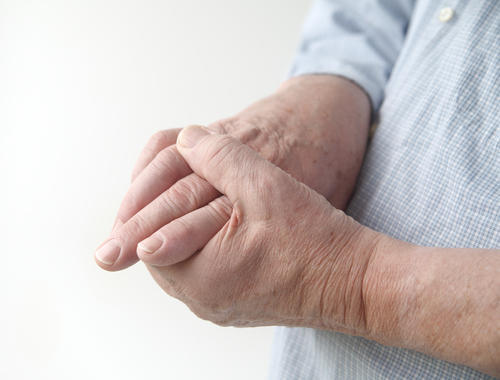Have you ever had spontaneous and uncontrollable finger twitching? This is a common phenomenon. It could be as simple as stresses of life: nature of your job or your lifestyle. Maybe you’ve been texting non-stop and have muscle strain or fatigue. However, persistent finger twitching could be a symptom of an underlying condition that may relate to your brain or muscle abnormality. Hence, it is necessary to consult a physician in case of a persistent finger twitching.

Why Does My Finger Twitch?
1. Overuse
This is especially common to people whose jobs require a lot of typing. Even those who are always on their mobile phones texting get affected too. This is because the muscles in the fingers get strained and fatigued, causing involuntary twitching. When this happens, it can affect one or more fingers.
2. Nutritional Deficiencies
When the levels of calcium, magnesium, and potassium in the body are below par, the result can be twitching and muscle cramps. High intake of carbonated drinks often interferes with electrolyte balance, which leads to symptoms such as finger twitching.
Excessive vomiting, diarrhea, and perspiration can also lead to depletion of minerals such as potassium, cause an imbalance of the electrolytes and subsequently lead to finger twitching. Therefore, the next time you are wondering "Why does my finger twitch?" reevaluate your intake of carbonated drinks.
3. Carpel Tunnel Syndrome
The carpel tunnel is a fibrous sheath within the middle of your wrist. The median nerve runs through this tunnel. The Carpel Tunnel Syndrome (CTS) is a condition characterized by twitching, burning and tingling sensation and sometimes weakness when gripping something. It is brought about by compression of the median nerve, due to overuse of muscles, ganglion or lipoma. Treatment options include medications, lifestyle changes, splinting and surgery.
4. Parkinson’s Disease
Parkinson’s disease is a debilitating condition that starts with minor twitches and tremors which get worse as the disease progresses. This neurological affliction starts when the cells responsible for dopamine production in the brain begin to undergo slow but progressive deterioration.
Parkinson’s disease can be managed by drugs, lifestyle changes and surgery in advanced cases. Drugs such as levodopa are effective in managing this disease, and physical therapy helps in maintaining balance and reducing tremor. In advanced situations, surgery involving deep brain stimulation is done.
5. Amyotrophic Lateral Sclerosis
This is a degenerative nerve disorder that produces finger twitching. It involves the progressive death of the nerve cells that eventually affects the whole body system plus its functioning. The twitching and spasm eventually evolve into muscle wasting.
The disorder is confirmed with imaging, blood, and neurological testing. ALS can be managed by medication to reduce muscle spasms, cramping, fatigue, pain, and depression among others; nutritional changes; and therapies such as speech, physical and breathing care.
6. Myopathy
Myopathy is a condition characterized by the impairment of the skeletal muscles. Myopathies can be inherited, caused by inflammation and brought about by endocrine problems. Common symptoms of myopathies include cramps, muscle weakness, and tingling sensations.
7. Multiple Sclerosis
Another condition that could answer the question "Why does my finger twitch?" is multiple sclerosis (MS). The condition develops when the immune system attacks the myelin sheath, (the fatty substance that insulates the nerve fibers) and even the nerves themselves. The problem can affect the whole of the nervous system, including the spinal column. The result is twitching, numbness and tingling sensations.
8. Other Causes
Other reasons why your finger may twitch include:
- Excess intake of drinks containing nicotine and caffeine
- Nervous twitching due to anxiety. This is usually nothing to worry about and goes away after some time.
- Muscle cramping around your fingers
- Dehydration
- Diuretics and corticosteroids
If you notice that the finger twitch problem persists after a while or the pain is progressive, you need to consult a doctor as soon as possible. A physician will carry out an assessment to determine the root cause of the problem.
How to Stop Finger Twitch
Why does my finger twitch? You already know the answer. Although finger twitching is an involuntary thing and goes away on its own, there are some few measures you can take to reduce or prevent it.
- When working, especially typing, take regular breaks in intervals to help relax your fingers and put the muscles at ease.
- Stay hydrated to maintain the electrolyte balance in your body system. Drink plenty of water and fruit juices. You can also eat fruits that contain plenty of water such as watermelon, cucumbers, and lettuce.
- Take foods that will enrich your body with vitamins and minerals such as potassium, magnesium, and calcium. Green vegetables and nuts are a rich source of these minerals and vitamins.
- Avoid caffeinated, and carbonated drinks.
- Medication containing zinc is effective in treating twitches and spasms and also helps in soothing your nerves. It also helps in the absorption of magnesium.
- If you exercise regularly, make sure you take drinks and snacks that will help restore the body’s state. Also, ensure that you don’t overdo the exercising as this will beat the purpose in the first place.
